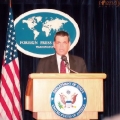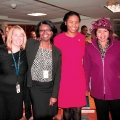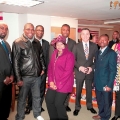Washington DC – The Obama administration has said that it remains committed towards implementing Policies towards Africa. The Deputy Assistant Secretary for African Affairs Bruce Wharton who represented Assistant Secretary for African Affairs Johnnie Carson explained the implementation strategies at a press briefing with African Bureau press at the Foreign Press Center in Washington DC.
Secretary Wharton highlighted the policy areas which include; democracy, economic growth, health care, conflict resolution and transitional challenges. He mentioned that the Secretary of State Hillary Clinton and President Barack Obama are profoundly committed to putting Africa back at the center of U.S foreign policy. He added that there will be greater emphasis on Africa in 2011 and 2012.
On Democracy, the US will work with African partners to strengthen democratic institutions, to protect democratic gains, and to counter unconstitutional changes in government.
In the year ahead, there will be 17 presidential elections on the continent of Africa and about 24 elections in the next two years, including parliamentary, local and presidential.
In 2011, the US will observe several elections in countries such as Uganda, DRC, Liberia and Nigeria, which according to Wharton will be a very, very important election. The US is however worried about the example that Cote d’Ivoire sets for the rest of the continent, as former President Gbagbo refuses to step down. To this end, the US will be putting a lot of energy into supporting those electoral systems in all of these countries to make sure that the will of the people is clearly expressed and then respected.
On economic growth, the US seeks an Africa that is prosperous and at peace. “We’re working with African nations to foster sustainable economic development and growth. I mentioned “Feed the Future; that’s three and a half billion dollars a year, and will have direct economic implications as it’s heavily focused on sustainable agriculture”.
The other big economic piece that we’ve got in Africa is the Africa Growth and Opportunity Act. In 2010, we did something new with AGOA – we did two things new. First, we brought a group of women entrepreneurs from Africa, 37 of them, to participate here in the ministerial and in the civil society portions of the AGOA Forum. We took the group out to Kansas City in Missouri to take a look at American agricultural know-how, equipment, technologies. We do believe that one of the things that Africa and the United States have in common is that we’re both nations of farmers at some level and both capable of producing all the food we need.
The US had also launched something called Apps4Africa. We brought a group of African technologists from East Africa together with civil society leaders. And the challenge was for the civil society leaders to describe a problem that they had and for these technologists to think about applications that would exist on cell phones or smart phones or computers to help resolve simple challenges. So we sponsored a contest which provided a modest award for the winning application.
We had an international panel of judges. The winning application turned out to be something that resides on a simple cell phone that allows a farmer to calculate with accuracy the gestational period of a cow. But this is very important if you’re a cattle breeder, as many people in East Africa are. It allows people to improve their herd and grow more productive and healthier cattle herds.
On health care, the United States has a record to be proud of in terms of providing relief on HIV/AIDS. The Obama Administration is now looking to expand that into other diseases such as malaria and waterborne diseases. The Obama Administration has pledged $63 billion in health initiatives over the next five years, as they continue to look at ways to take what we’ve learned in the PEPFAR program, the President’s Emergency Plan for AIDS Relief, and apply it to other communicable diseases.
The fourth pillar is resolving conflict. The US will continue its strong commitment to work with African states and the international community to prevent and resolve conflicts. These are conflicts that don’t just affect a single country, but the region and the world. And one of the keys here is working with African governments. I think if there’s a silver lining to be found in the situation in Cote d’Ivoire, it’s in part the way African leaders have come together to stand up in defense of democracy.
The fifth pillar of the US approach to Africa has to do with trans-national challenges. This includes international crime, drug smuggling, weapons smuggling, trafficking in persons, piracy, which is a growing issue, and terrorism. The US is finding a lot of good cooperation from African governments and the international community to address this range of issues.
On bi-National issues, Sec. Wharton mentioned the existence of three bi-national agreements in Africa; Nigeria, Angola, and South Africa. The Nigerian agreement is working very well with the hosting of several working groups.
by Dami Odetola and Tosan Aduayi for Trendy Africa Media






